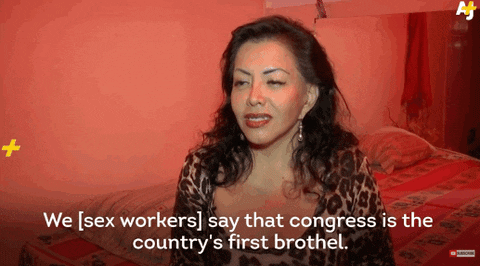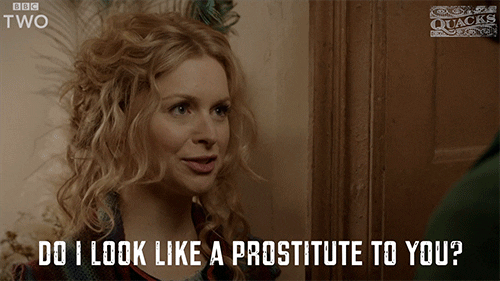Money can buy a lot of things. That meat-lovers pizza you enjoy. Endless streaming options. All the toilet paper you could ever need. While money can’t buy you love, it can buy you sex. Whether or not paying for sex is legal is pretty clear-cut in most places, but in this deep dive, we’re asking the thornier question: Is it wrong to pay for sex? We contemplate arguments on both sides of the debate to help you, ahem, come to your own conclusion.
Cover Photo: RapidEye (Getty Images)
Deep Dive: Is Porn Ruining Your Sex Life?
Deep Dive: Do More Partners Make You a Better Lover?
Follow Mandatory on Facebook, Twitter, and Instagram.
Deep Dive Wrong to Pay for Sex
-
Paying for sex is efficient.

We get it. Maybe you’re climbing the corporate ladder and don’t have time to pursue a one-night stand or maintain a relationship with a girlfriend. Maybe you just want some quick, physical gratification and, like anything else you can exchange for money these days, paying someone for sex feels like a business transaction. Where's the harm in that?
-
There are different kinds of paid sex.

Paying for sex isn’t a black and white issue – think more like 50 shades of gray. Like many things in life, it’s complicated. Buying sex from an underage girl in an impoverished country is different than being a sugar daddy to an adult woman who is fully consenting and aware of what she is selling – and is using the money to better her life, like for grad school. Men who are unable to find willing sexual partners because of their physical appearance, disabilities, or social awkwardness may turn to paid sex because, just like any other human, they have physical needs, too. When we talk about paying for sex, every situation is unique, making it difficult to issue a blanket moral statement.
-
Paying for sex isn’t only about sex.

Sydney Biddle Barrows, an infamous madam, has talked about how the call girls in her employ would spend less than 10 minutes actually having sex with clients, but most appointments lasted hours. Why? Because men using her service weren’t only looking to get off; they also wanted company, whether that meant having pillow fights or a dining companion. For some men, the payment isn’t only for the sex, but for attention and affection, making the concept of prostitution a lot easier to swallow.
-
Sex is already a commodity.

Even if you don’t give a prostitute a wad of cash, some would argue that men pay for sex in other ways. They pay by buying a woman drinks or dinner or flowers. They pay by purchasing an engagement ring. They pay by marrying her and supporting her financially. The exchange of money and sex between men and women is nothing new, but when men pay women exclusively for sex, it raises all sorts of morality questions. Some argue that it is more respectful to pay a prostitute for sex than to seduce a woman and convince her to give them sex for free (or for the cost of a few cocktails).
-
But sex isn’t like any other commodity.

You can’t compare sex to anything other service rendered. It isn’t the same as getting a haircut or having someone prepare a meal for you. Sex involves physically (if not emotionally and spiritually) merging with another human being. It is the most intimate act that most people will perform with one another. Can we really put a fair price on that?
-
The problem isn’t paying for sex, it’s the lack of regulation.

At least, that’s the argument some (mostly men) make. They say that prostitution has always existed and isn’t going to go away, so the least we can do is set up parameters that make conditions safer for sex workers. They claim that by removing the veil of secrecy associated with selling sex on the black market, sex workers will have proper channels to make complaints and receive fair compensation. Proponents of this argument point to places like New Zealand, where prostitution is legal and rates of abuse and rape are reportedly low.
-
Sex slavery is a huge problem.

There are anywhere from 30,000 to 50,000 sex slaves in the United States. The average age at which women enter prostitution is 13 or 14 years old. Even if there are laws prohibiting child prostitution, by giving prostitution the “OK” moral stamp, we’re opening the door to an industry that will prey upon girls and young women. Anytime you commodify something, you create a demand and supply chain. If we agree as a society that paying for sex is OK, demand will increase, and supply will need to increase as well to meet that demand. The likely result? Underage women and girls will be recruited to fill that demand -- against their will.
-
Prostitution is not a choice for many women.

We would like to think that all women who sell sex are doing so because they enjoy it (or at least the money they make from it). That is simply not the case. Many women “choose” prostitution because they have no better economic options for making ends meet. Gender inequality, pay gaps, and discrimination are at the root of why women succumb to prostitution. After all, how many down-on-their-luck dudes resort to prostitution to buy food, pay for rent, or care for their children? Women in prostitution also tend to among the disenfranchised -- meaning lower-income and/or women of color.
In one study, 85 percent of women in prostitution said that they wanted to get out, but didn’t know how to. Does that sound like a choice to you?
-
Sex work and psychological disturbances are linked.

Some sex workers have a history of molestation that may have led them into prostitution. Even when women “consent” to renting out their orifices, they work under the constant threat of rape or other physical and psychological harm. It is a dangerous job. Depression, dissociation, PTSD, substance abuse, and suicidality are rampant among women who participate in prostitution. When you pay for sex, you are not empowering women, you are enabling their dysfunction.
-
Paying for sex promotes inequality.

Paid sex isn’t completely consensual. It’s “my way or the highway” sex, and the person with all the power is the one paying for it. In most situations, the man is paying and the woman is submitting. The fact that she wouldn’t be having sex with you unless an exchange of funds was involved shows how skewed the power dynamics are.
-
The Takeaway

Is it wrong to pay for sex? The answer may be: “It depends.” It depends if the woman you’re paying truly had a choice in becoming a prostitute – or if she was coerced into sex work by past abuse, as an underage girl, or by gender-based economic disparities. It depends if you respect her boundaries regarding what acts she is and is not willing to do. It depends if you wear a condom. It depends if, by paying for sex, you’re strengthening a system of oppression against women. If we must lay down a verdict, we’re going to say, yes, it is wrong to pay for sex. Though it might take more effort, aim for free, consensual sex. There is someone for everyone, if you're willing to be patient and do the self work to make yourself a more appealing sexual prospect.









